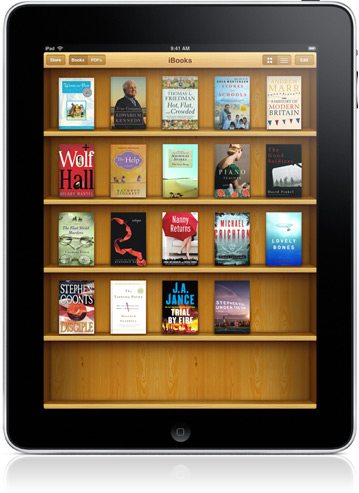There’s been some interesting news about the Kindle today. One in five people who buy ebooks from Amazon’s Kindle store don’t actually own a Kindle!
That’s the surprising result from a new report by Cowen and Co., an investment banking company which just released the results of their survey Monday. This spring there were predictions that Apple’s iPad would effectively eliminate Amazon’s Kindle — or at least hurt Amazon’s sales of ebooks with new competition from Apple’s iBookstore. But instead, the analysts concluded that the iPad “is not having a negative impact on Kindle device or e-book sales.” In fact, 31% of iPad owners said they’re still most likely to purchase their ebooks from Amazon’s Kindle store. And the number who prefer Amazon’s Kindle store rises to 44% among “heavy readers” who buy more than 25 books each year.
This leads the report to an unavoidable conclusion: the more iPads that get sold, the more ebooks Amazon will sell. It predicts Amazon will sell over $700 million worth of ebooks in 2010 — triple what Amazon earned from ebooks just last year. And the analysts even dared to venture a prediction for the year 2015. For this year they’re estimating Amazon will grab 76% of the ebook market (versus 5% for Apple). But even five years from now, in 2015, they’re predicting that Apple’s iBookstore will represent just 16% of the ebook market, while Amazon still sells 51% of all ebooks.
Of course, there was another famous prediction about ebooks in the year 2015. Nicholas Negroponte is the futurist who founded both MIT’s Media Lab and the “One Laptop Per Child” association, and he’s projected that the printed book will be dead within five years. It’s important to put his prediction in context, since his association hopes to distribute cheap computers to students in the developing world — and he’s obviously focused on cheap ebooks as part of that effort. Plus, his statement was made in response to sales figures showing that ebooks were outselling printed books — leaving open the possibility that he really meant that ebook sales would just massively outweigh the sales of print books.
I wrote last month about how MIT’s technology blog contradicted him, arguing that “it’s just as likely that as the ranks of the early adopters get saturated, adoption of ebooks will slow.” But I thought it was interesting that the iPad also came up in that discussion. Technology reporter Christopher Mims had noted the praise for the iPad’s crisp, high-resolution screen, with one developer at Microsoft gushing on his blog that it had “moved us out of the Dark Ages.” Mims’ alternate conclusion upon hearing that quote? “Many tech pundit wants books to die.”
“Really….”
It’s fun to look into the future, but I’ve got a statistic of my own. One year ago, you could buy a refurbished version of Amazon’s original Kindle for just $149. Obviously, today you can buy a new Kindle for $139. But how much would it cost you to buy a refurbished original Kindle now? Just $110, according to the latest results in Amazon’s Kindle store.
Maybe we should all just live for today, and grab one while they last!

Am I a good example? I was never persuaded by e-books until I acquired an iPad. I bought a couple of titles in iBooks and Kindle-for-iPad and suddenly the penny dropped. I understood the appeal, especially from a convenience perspective. But the iBooks store is like a supermarket with empty shelves, so Amazon got all my subsequent business. In a final twist, I bought a Kindle 3. The iPad had convinced me that e-books are the future of reading, but it equally convinced me that the iPad is not the device on which to do it. As a Trojan Horse for Amazon, the iPad has therefore been an amazing success if my example is any indication.